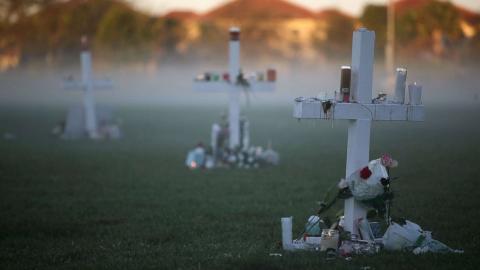Is there any more grotesque example of American “exceptionalism” than our longstanding failure to respond to recurring, murderous violence in our schools?
Is the nation that led mankind to the moon and back unable to halt the tragic transformation of children and teachers into the neatly gathered, heedlessly compliant soft targets for cowards wielding weapons of war?
THE CURTAIN RISES ON OUR KABUKI THEATER
As the smoke and chaos cleared from the Marjorie Stoneman Douglas School, our politicians are stepping up to their familiar marks on the national stage.
Some immediately called for bans on assault weapons. Others called for securing schools, turning them from hostage camps to little forts. Many such proposals are occasioned by the most recent tragedy, even as they may or may not represent solutions.
Even “thoughts and prayers” have become weaponized. This most basic expression of solidarity, having become tragically routine, is dismissed by some as a substitute for action.
FROM OLD GLORY TO OLD GORY
One thing we know: the United States is the world capital in school-related murder.
Nonetheless, our political system remains inert. With the whole world watching, the Special Interest State is turning Old Glory into Old Gory.
The National Rifle Association holds a dominant position. It makes cunning use of our government’s bias against action to maintain the status quo.
The NRA, as powerful as it is, is not the sole cause of our Washington’s paralytic incoherence.
The partisan duopoly that runs Washington is operating in high gear.
Many Republicans are running for cover, so to speak. With the NRA, they’re grasping for arguments that the availability of weapons of war to disturbed people, including children, is somehow unrelated to school rampages.
Many Democrats, holding the high ground, so to speak, train their rhetorical fire on the NRA. The implication is that new laws banning or strictly regulating guns are the sole or primary solution.
As you read this article, you can be certain that our politicians are huddling with campaign strategists and fundraisers, plotting how this national tragedy can be fit into their personal and partisan political interests.
This is worse than unworthy. It’s disgraceful.
CALLING INDEPENDENTS
“Good government” types notwithstanding, this is not a moment for “moderation.”
What we need is decisive independence, a clean break from the Special Interest State and its janissaries.
Such leadership could come, theoretically, from the White House or the Congress. However, after a generation of inaction interlaced with spasms of ineffective gestures, we need to move from the bottom-up, from the outside-in.
The young people rising in response to the Stoneman High School massacre may constitute a compelling vehicle for change. Social media has evolved to the point where many of us can be mobilized in their cause.
Among the issues that might be considered:
- Set the end of the school year at Stoneman as a deadline for focusing political action. This is one topic that speakers should have something useful to talk about in commencement season.
- American children and their teachers should not be asked to return to school year this autumn absent tangible actions for their protection in place.
- Existing laws and regulations should be inventoried. The process should be transparent. There are many existing requirements that are likely not well enforced or coordinated.
- The Second Amendment, to use the words of Justice Robert Jackson in another context, is not a suicide pact. Even the most absolute of the Bill of Rights, the First Amendment, allows for reasonable regulation. The same principle applies to gun regulation. Every alternative should be transparently reviewed, including expanding bans of categories, as occurred in the 1930s with the ban of private ownership of machine guns.
- The nexus of mental health and gun violence must be straightforwardly addressed. Individuals who would own firearms are undertaking a public safety responsibility. Given the risks presented by gun violence, it’s reasonable to ask that individuals owning firearms meet an appropriate standard.
- Liability rules should be reexamined. To what extent should sellers of guns be liable? What about manufacturers? What about the families of murderers? What about government agencies that fail to take advance action, despite reasonable warnings? Insurance requirements could spread the costs, moving them toward those creating the risks.
- There should be a reconsideration of the authority of teachers and administrators to take precautionary action against students or visitors who may pose a threat of violence, including gun violence. Again, when the potential of gun violence exists, the law should tilt toward protection of the innocent.
GETTING THERE FROM HERE
More children were slaughtered at Marjorie Stoneman Douglas School than gangsters in the St. Valentine’s Day Massacre in 1929.
The gangland violence of the Prohibition years was a spur toward initial national firearm regulation in the 1930s. Changed circumstances prompted a reconsideration of how to apply constitutional protections. There’s general acceptance of the ban on machine guns, for example.
The gun violence in schools is not the only change we’re facing. There’s also the paralysis of government to respond.
The problem of gun violence in America has numerous causes. It’s what the experts call a multivariate issue. Like the opioid crisis, it has a spiritual as well as more familiar, political components.
The one certainty is that special-interest-driven, weaponized two-party politics are entirely insufficient for this hinge moment. It should not require a rising body count of schoolchildren to make that clear.
James Strock is an American entrepreneur, author, speaker, and former senior-level public official. He is the author of three books on leadership, and a fourth on political reform in the United States.
